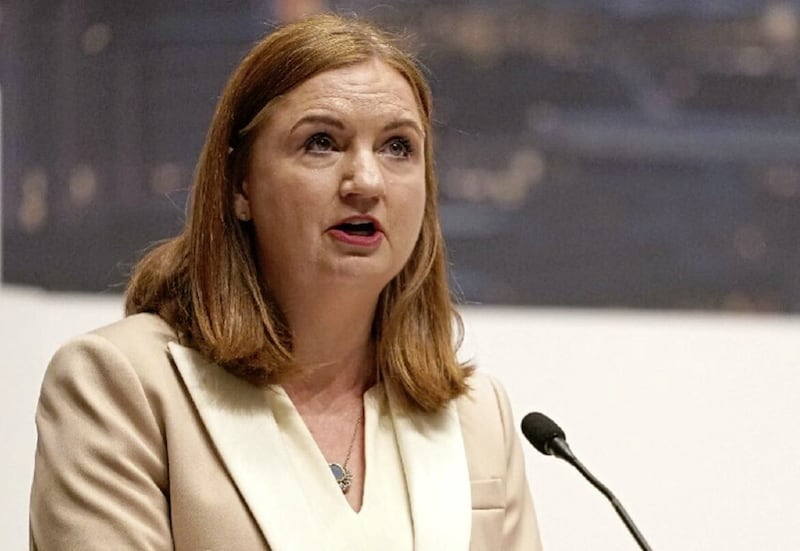The Northern Ireland Civil Service (NICS) is an irredeemably delinquent institution.
That is the only conclusion to draw from new revelations on its veterinary whistleblower scandal.
In 2016, a vet at the Department of Agriculture, Dr Tamara Bronckaers, raised concerns about animal cruelty and the deletion of records at a Ballymena livestock market.
Records are essential to food safety, fraud prevention and the reputation of Northern Ireland’s £5.5 billion agrifood industry, not to mention any hope of mitigating the sea border.
Bronckaers used the correct internal whistleblowing procedure, yet was bullied out of her job. An industrial tribunal found in her favour and ruled “the attitude to her went all the way to the top”.
Read more:
PwC report on whistle-blowing case finds senior civil servants failed to heed lessons of RHI
Newton Emerson: RHI lessons still not learned
Newton Emerson: Why isn't the vet scandal a police matter?
The department tried to take the judgement to the Court of Appeal – a highly unorthodox move – before backtracking in April last year amid mounting media criticism. Legal fees and compensation cost the taxpayer £1.5 million. The two senior officials criticised by the tribunal were not disciplined and one then promoted the other.
Head of NICS Jayne Brady declared it a “personal priority” to have the scandal investigated promptly and an “independent review” was commissioned from private consultants PwC.
When it was published this January, six months late, Mrs Brady said the civil service was “committed to learning from this review and addressing the issues identified”, which included failure to keep notes of key meetings. She published a 33-point action plan on its recommendations.
However, the Belfast Telegraph has now discovered NICS undermined, delayed and watered down the report. PwC was not allowed to interview anyone or inspect documents. The report was ready on time but officials held it up by demanding removal of criticism.
Among the findings deleted were that NICS had broken its own code of ethics and policy on managing public money. Damning references to the appeal case and the promotion were removed, as were suggestions those responsible could be disciplined.
Meanwhile, Mrs Brady and her officials debated how to fob off media questions.

Consultancy firms are often accused of reluctance to bite the government hand that feeds them. In fairness to PwC, it clearly tried to do the job it had supposedly been hired to do. Consultants might consider the reputational damage of being roped into these farcical exercises. Is having NICS slap your logo on its cover-up really worth the fee?
The more fundamental question is why nothing has changed since RHI.
New Decade, New Approach included civil service reforms and new oversight mechanisms based precisely around such problems as failing to keep notes. Mrs Brady’s appointment in 2021 was meant to herald a new broom: she has an engineering background and was recruited externally. Alas, like Trigger’s broom in Only Fools and Horses, NICS is the same no matter how many times you change the head and the handle.
Although RHI was a failure of ministers and officials, absence of ministers is oddly incidental. Devolution has collapsed twice during the Bronckaers saga without NICS appearing to be any more or less a law unto itself. There is no evidence of a minister ordering the appeal, for example, despite ministers being in place.
Stormont’s ‘indirect rule’ limbo has left NICS largely in charge but direct rule would be scant improvement. Nationalists who condemn it for lacking Dublin input forget how it also lacked London input. Part-time ministers flew in and out, never grasping the detail of their departments.
Unionism is missing a trick by not floating the idea of UK-wide integration. Northern Ireland’s self-contained civil service has always been a unique arrangement. In Scotland and Wales, civil servants serve the devolved administrations but remain employees of the so-called ‘home’ civil service, covering Britain.
Running a miniature copy of Whitehall for a region with the population of Kent may go a long way to explaining why NICS thinks it lives in its own unaccountable little universe. It could be abolished and its staff merged into a UK structure without impinging on devolution or the Good Friday Agreement.
While this idea is unlikely to win nationalist support, it could smoke out nationalism’s vision of the future, where NICS is abolished and most of its staff become redundant. Sinn Féin does not spell out what it means by “ending duplication” in a united Ireland but the number of regional administrators for Leinster is currently zero.
Would NICS be motived to do a better job if there was a public debate on its existence?
It feels like the last thing left to try.









